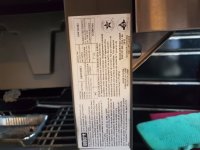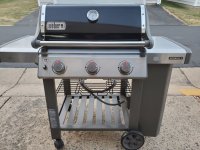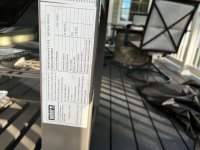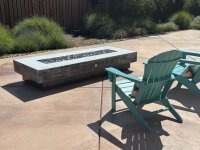You are using an out of date browser. It may not display this or other websites correctly.
You should upgrade or use an alternative browser.
You should upgrade or use an alternative browser.
Natural Gas Line Question
- Thread starter Dave Moser
- Start date
LMichaels
TVWBB 2-Star Olympian
Well, is he having issues with any other gas appliance in his home? Barring that, there is nothing in the hookup you describe to cause an issue other than possible mishandling of how the connections were actually made. Sorry to not be of more help, But, these things are really hard to mess up Or maybe the persons expectations are above what the grill can do? I've cooked on one of those and found it extraordinarily weak performingOh ya definitely. I took a pic of the stickers and it clearly says NG....let me see if I can post them
Brett-EDH
TVWBB Olympian
It could be the ignition method. I’ve had low pressure on NG lines before.
Recommendations:
Main gas in closed position.
Open grill hood.
Open and bleed the lines at the grill.
Close flow at the grill by closing each knob.
Open main line for gas to flow. Wait 30 seconds.
Open and fire one valve only at the grill. The hood is still in the open position.
Once one valve is lit, then open amother valve and listen for ignition. Then do the third valve.
Close hood and pre heat.
This method worked for me when I had low pressure.
Maybe it will work for your buyer.
Recommendations:
Main gas in closed position.
Open grill hood.
Open and bleed the lines at the grill.
Close flow at the grill by closing each knob.
Open main line for gas to flow. Wait 30 seconds.
Open and fire one valve only at the grill. The hood is still in the open position.
Once one valve is lit, then open amother valve and listen for ignition. Then do the third valve.
Close hood and pre heat.
This method worked for me when I had low pressure.
Maybe it will work for your buyer.
Hmmmmm I appreciate your help and trouble shooting. The only thing I can think of is that maybe bee's or bugs crawled into the gray hose during the period of no use....or that his line is flowing at low psi. I was going to ask him to roll it over to his next door neighbors if they all have NG there
Brett-EDH
TVWBB Olympian
I think all NG grills have regulators. Otherwise you’d have whistling at the grill from the pressure.There is no "safety" valve on NG lines and IIRC those grills do not have a regulator
LMichaels
TVWBB 2-Star Olympian
No you would not and nearly all do not have a regulator. There isn't enough pressure in NG lines to whistle anything. Hell you're only talking about .25 PSI MAX, and if you think about it an LP grill runs at 40% higher pressures with .37 PSI (11" WC) and no whistlingI think all NG grills have regulators. Otherwise you’d have whistling at the grill from the pressure.
Brett-EDH
TVWBB Olympian
I just installed an adjustable regulator on an 8’ fire table. It was whistling. The regulator is adjustable from, IIRC, 3-7” WC. My NG summit had a NG regulator on it. My KA cooktop had a NG regulator on it. I disagree with your statement.No you would not and nearly all do not have a regulator. There isn't enough pressure in NG lines to whistle anything. Hell you're only talking about .25 PSI MAX, and if you think about it an LP grill runs at 40% higher pressures with .37 PSI (11" WC) and no whistling
LMichaels
TVWBB 2-Star Olympian
I've installed a few Weber Genesis NG for family and friends. No regulators. The Summits did come with one. I'm not sure why Summits come or came with one and not Genesis. They're not necessary at all. Really. Home appliances come with adjustable ones because they're made to be used with either LP or NG. And if you look at the owner's manual that comes with just about any gas appliance you buy for your home you will see instructions on how to switch out the orifices (which are included) and set the regulator for the other fuel.I just installed an adjustable regulator on an 8’ fire table. It was whistling. The regulator is adjustable from, IIRC, 3-7” WC. My NG summit had a NG regulator on it. My KA cooktop had a NG regulator on it. I disagree with your statement.
but, I've never seen a Genesis in NG come with one (or many other brands of NG grills). I'm not sure why the Summits have one.
And actually somewhere on this very forum this discussion took place a number of years back due to the same question about a Genesis. And there was no regulator on the assembly list. I had recommended one to that other poster simply because they had a couple of appliances inline with the grill, along with new orifices for the lower pressure, to keep the flame more stable in the grill when other appliances came on or off line.
Was a VERY long time ago. But recall the gist of the conversation.
I have no clue why you got "whistling". Or what was actually whistling. But you're taking on experience and trying to make it the "rule" which it's not.
There really is no need for a regulator on a NG appliance except in some cases to help maintain a steadier flame appearance. But, an appliance (be it a grill, a kitchen stove, a griddle, and so on running on a 7" gas supply and with properly sized orifices has no need at all for a regulator.
And the ONLY reason for one on an LP grill is because of the high pressures in an LP tank.
Honestly I've done a lot of NG Genesis grills. I didn't just fall off the cannoli cart and make it up
TomRc
TVWBB Pro
Modern natural gas regulators often serve more than one purpose. Some will stop the flow of fuel entirely if they are no longer able to control the pressure. Some have relief valves or check valves. Some prevent surges. Are any or all of these features needed to get proper flow to a BBQ grill in a natural gas line?…not at all. These grills will work just fine without additional regulation on household pressure. And, because they are designed as an outdoor use device, lower BTU models likely won’t have or be required to have them. However, kitchen stoves and other appliances like gas dryers are required to have a built-in regulator even in natural gas applications. It’s all a case of living in today’s CYA world.
FWIW - natural gas regulators on higher BTU BBQ grills and appliances are probably in place to stabilize the flow rather than fully regulate it. A good example of this is standby backup generators where the gas flow goes from zero to OMFG immediately upon start-up. A secondary NG regulator here makes a world of sense.
I don’t think anyone is truly wrong in this discussion. There’s just a lot of layers to the right answers.
FWIW - natural gas regulators on higher BTU BBQ grills and appliances are probably in place to stabilize the flow rather than fully regulate it. A good example of this is standby backup generators where the gas flow goes from zero to OMFG immediately upon start-up. A secondary NG regulator here makes a world of sense.
I don’t think anyone is truly wrong in this discussion. There’s just a lot of layers to the right answers.
Bruce
TVWBB 2-Star Olympian
I believe some homes have a higher pressure piped in from the outside meter. That is for homes that have a possibility of a higher demand for NG than those piped with the regular 11 WC. In that case each line needs a regulator to hold down the pressure to individual appliances.
I have picked up quite a few Weber grills that were born NG. NONE of them ever had any kind of regulator on them. Those hose went directly into the manifold. Any regulator would have to be on the line or outlet for the NG line.
I have picked up quite a few Weber grills that were born NG. NONE of them ever had any kind of regulator on them. Those hose went directly into the manifold. Any regulator would have to be on the line or outlet for the NG line.
LMichaels
TVWBB 2-Star Olympian
Back when I was working for Delta up in MSP, I rented a room from my wife's friend in a burb about 20 min SE of the airport (Woodbury). Her house had the weirdest gas setup I ever saw. Everything was piped in with small 3/8" flexible copper. (similar to what you would see on a high pressure AC line. Then every appliance had a separate regulator in addition to the regulator it came with. There was no regulator at the meter. And all the copper had "high pressure gas" warning labels. I've never seen that since or before.
Likely the only reason the Summit and some higher BTU grills have this is like Tom said. So that the flow is more stabilized under high BTU use fluctuations. A Genesis is far from a high btu device. Whereas a Summit 6 burner with a sear burner plus a side burner and rotisserie burner you're talking some pretty bad fluctuations on the line. And yes they absolutely do help with those surges in pressure or sudden drops in pressure. Or like when you're cooking on your stove top and baking. Typically ovens do not change the burner output to regulate. They only turn on/off (one reason I hate gas ovens). So you have say 2 or 3 pots on the stove top maybe on a very low simmer and a roast in the oven (think Nona making Sunday Gravy and a roast) Top burner on VERY low simmer, for the gravy, oven lights up. Sudden draw. No regulator, simmer burner goes out. Now you have makings of disaster (ruined gravy or worse)
Top burner on VERY low simmer, for the gravy, oven lights up. Sudden draw. No regulator, simmer burner goes out. Now you have makings of disaster (ruined gravy or worse) 
They DO serve a purpose. And are there in SOME not all outdoor applications.
Likely the only reason the Summit and some higher BTU grills have this is like Tom said. So that the flow is more stabilized under high BTU use fluctuations. A Genesis is far from a high btu device. Whereas a Summit 6 burner with a sear burner plus a side burner and rotisserie burner you're talking some pretty bad fluctuations on the line. And yes they absolutely do help with those surges in pressure or sudden drops in pressure. Or like when you're cooking on your stove top and baking. Typically ovens do not change the burner output to regulate. They only turn on/off (one reason I hate gas ovens). So you have say 2 or 3 pots on the stove top maybe on a very low simmer and a roast in the oven (think Nona making Sunday Gravy and a roast)
They DO serve a purpose. And are there in SOME not all outdoor applications.
Good conversation here as usual. I always learn a lot from this forum. One last question. My customer says he did an air bleed of the system and now has the grill up to 400.....I still think that is a little low on the temp but I have heard that NG grills dont get blazing hot like some propane grills. He is reading along and will be joining this forum as well. Should a NG 310 get up over 500 like all of the propane grills do?
Brett-EDH
TVWBB Olympian
All my NG grills got over 500°F, easily.Good conversation here as usual. I always learn a lot from this forum. One last question. My customer says he did an air bleed of the system and now has the grill up to 400.....I still think that is a little low on the temp but I have heard that NG grills dont get blazing hot like some propane grills. He is reading along and will be joining this forum as well. Should a NG 310 get up over 500 like all of the propane grills do?
DanHoo
TVWBB 1-Star Olympian
Jim,Good conversation here as usual. I always learn a lot from this forum. One last question. My customer says he did an air bleed of the system and now has the grill up to 400.....I still think that is a little low on the temp but I have heard that NG grills dont get blazing hot like some propane grills. He is reading along and will be joining this forum as well. Should a NG 310 get up over 500 like all of the propane grills do?
a Genesis II 310 natural gas is 39,000 BTU from what I've found.
I can say a 2016 Genesis E310 Propane took a while to get it to 500F, but it would get there. It is a 38K BTU system.
The front control Genesis 3xx grills are proportionally larger for the BTU output when compared with Side Control 3x0 grills which are 42K BTU.
Personally, I think it should get to 500F, but the three burner front controls are underpowered so getting to 500F may take a while even with LPG.
The E310 LP I have is in the garage in pieces so I can't test it.




